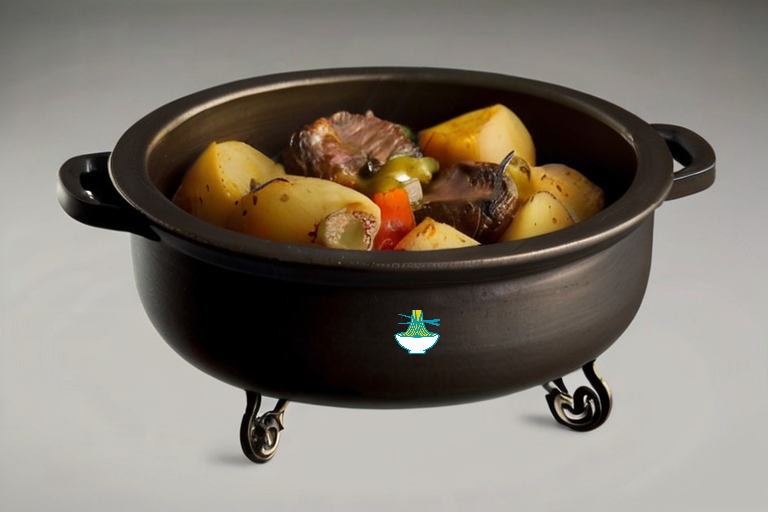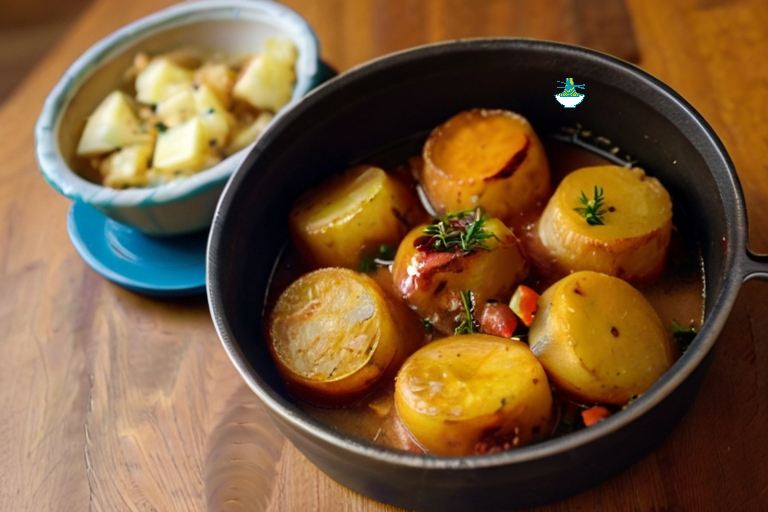Immerse yourself in the rich gastronomic heritage of Croatia with the tantalizing Peka, a traditional dish celebrated for its flavors and cultural significance. Originating from the Dalmatian coast, Peka embodies the essence of Croatian cuisine, blending simplicity with exceptional taste. Join us on a journey to uncover the secrets behind this culinary masterpiece as we delve into its preparation, ingredients, and regional variations. From succulent meats to vibrant vegetables, slow-cooked under an iron bell, experience the magic of Peka that has been cherished for generations. Whether you're a food enthusiast or a cultural explorer, let the aroma and flavors of Croatia's Peka enchant your senses and transport you to the heart of this Adriatic gem.
Here's a traditional recipe for Croatia's Peka:
Ingredients:
- 1.5 kg (3.3 lbs) of meat (chicken, lamb, or beef), cut into large chunks
- 1 kg (2.2 lbs) of potatoes, peeled and quartered
- 500g (1.1 lbs) of onions, sliced
- 500g (1.1 lbs) of bell peppers, sliced
- 4 cloves of garlic, minced
- 4 tomatoes, sliced
- 2 bay leaves
- 2 sprigs of rosemary
- 2 sprigs of thyme
- Salt and pepper to taste
- Olive oil
- Optional: other vegetables like carrots, zucchini, or eggplant

Instructions:
Preparation: Preheat your oven to 200°C (390°F). Meanwhile, prepare all your ingredients: cut the meat into large chunks, peel and quarter the potatoes, slice the onions, bell peppers, and tomatoes, and mince the garlic.
Layering: In a large cast-iron or earthenware pot (Peka), start layering your ingredients. Begin with a layer of potatoes at the bottom, followed by onions, bell peppers, tomatoes, and garlic. Season each layer with salt, pepper, and a drizzle of olive oil. Add the bay leaves, rosemary, and thyme sprigs.
Adding Meat: Place the meat chunks on top of the vegetable layers. Season the meat with salt, pepper, and a bit more olive oil.
Covering: Cover the pot with a lid or aluminum foil, ensuring it's sealed tightly to trap the steam.
Cooking: Place the covered pot in the preheated oven and bake for about 2 to 2.5 hours. Alternatively, you can cook it outdoors by placing hot ashes on top of the lid, ensuring the heat evenly distributes.
Check for Doneness: After 2 hours, carefully remove the lid or foil to check the doneness of the dish. The meat should be tender and the vegetables cooked through. If needed, continue baking for another 30 minutes.
Serving: Once done, remove the pot from the oven and let it rest for a few minutes. Serve the Peka directly from the pot, allowing everyone to help themselves to the tender meat and flavorful vegetables.
Enjoy: Enjoy your Croatian Peka with a side of crusty bread and a glass of local wine, savoring the rich flavors and aromas of this traditional dish.
Note: Feel free to customize the recipe by adding your favorite vegetables or using different types of meat according to your preference. Adjust cooking times as needed to ensure everything is cooked to perfection.
Nutritional Values:
Here's an approximate breakdown of the nutritional values for the main ingredients used in the Croatian Peka recipe:
Meat (Chicken, Lamb, or Beef):
Chicken Breast (per 100g):
- Calories: 165 kcal
- Protein: 31g
- Fat: 3.6g
- Carbohydrates: 0g
benefits:
- Rich source of protein, essential for muscle growth and repair.
- Provides essential amino acids necessary for various bodily functions.
- Contains iron, which is important for oxygen transport in the blood.
Lamb (per 100g, cooked):
- Calories: 258 kcal
- Protein: 25.6g
- Fat: 16g
- Carbohydrates: 0g
benefits:
- Rich source of protein, essential for muscle growth and repair.
- Provides essential amino acids necessary for various bodily functions.
- Contains iron, which is important for oxygen transport in the blood.
Beef (per 100g, cooked):
- Calories: 250 kcal
- Protein: 26g
- Fat: 16g
- Carbohydrates: 0g
benefits:
- Rich source of protein, essential for muscle growth and repair.
- Provides essential amino acids necessary for various bodily functions.
- Contains iron, which is important for oxygen transport in the blood.
Potatoes (per 100g, raw):
- Calories: 77 kcal
- Protein: 2g
- Fat: 0.1g
- Carbohydrates: 17g
- 1 kg of potatoes is approximately 770 kcal.
benefits:
- Good source of carbohydrates, providing energy for daily activities.
- Contains vitamin C, which supports the immune system and promotes skin health.
- Provides potassium, important for maintaining electrolyte balance and muscle function.
Onions (per 100g, raw):
- Calories: 40 kcal
- Protein: 1.1g
- Fat: 0.1g
- Carbohydrates: 9.3g
- 500g of onions is approximately 200 kcal.
benefits:
- Rich in antioxidants, such as flavonoids and quercetin, which may reduce the risk of chronic diseases.
- Contains sulfur compounds that may have anti-inflammatory and antibacterial properties.
- Provides fiber, which promotes digestive health and may help lower cholesterol levels.
Bell Peppers (per 100g, raw):
- Calories: 31 kcal
- Protein: 1.3g
- Fat: 0.3g
- Carbohydrates: 6g
- 500g of bell peppers is approximately 155 kcal.
benefits:
- Excellent source of vitamin C, which supports immune function and collagen synthesis.
- Contains vitamin A, essential for vision health and immune function.
- Provides antioxidants like beta-carotene, which may reduce the risk of certain cancers and eye diseases.
Tomatoes (per 100g, raw):
- Calories: 18 kcal
- Protein: 0.9g
- Fat: 0.2g
- Carbohydrates: 3.9g
- 4 tomatoes are approximately 240g, so around 43 kcal.
benefits:
- High in lycopene, an antioxidant that may reduce the risk of heart disease and certain cancers.
- Good source of vitamin C, which boosts immunity and promotes skin health.
- Contains potassium, which helps regulate blood pressure and muscle function.
Garlic (per clove):
- Calories: 4 kcal
- Protein: 0.2g
- Fat: 0g
- Carbohydrates: 1g
- 4 cloves of garlic are around 16 kcal.
benefits:
- Contains allicin, a compound with antimicrobial and antiviral properties.
- May help lower blood pressure and cholesterol levels, reducing the risk of heart disease.
- Has antioxidant properties that may protect against oxidative damage and inflammation.
Please note that these values are approximate and can vary based on factors such as cooking methods and specific varieties of ingredients used. Additionally, the nutritional values may change if you modify the recipe or use different cuts of meat.


Comments